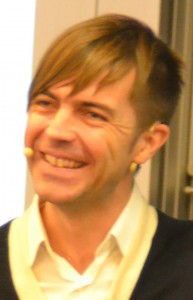Last week I was teaching on a new “Executive Program” for Spanish telecommunications giant Telefónica at their Corporate University north of Barcelona. A large multinational aiming to reinvent their business in the face of massive disruption, investment in their top executives is a priority. And executives they were, with over 100 of the company’s senior leaders’ present from the company’s main markets, from Sao Paolo to Madrid, and Munich to London.
The word executive has also been core to our own work the past 10 years. Yet what does it really mean? I asked my class to consider executive in terms of the verb instead of the noun. Specifically we considered the term executive function, those cognitive tasks carried out on the main by the frontal lobe part of the brain, and which include creative thinking, planning, strategising, and judging.
Such tasks are of course critical to all human beings, whether or not they are senior business leaders, with a key stage of infant development being linked to the development of executive function. Yet I believe such tasks need to be of special interest to today’s business leaders.
This is because the efficacy of executive function tasks has a close link to health. Research has shown that sleep deprivation does not significantly affect routine thinking but does have a great impact on non-routine executive thinking. Exercise has also shown to specifically benefit the frontal lobe part of the brain charged with those executive function tasks, yet such benefits dissipate after a few days which show the need to continually invest in exercise as a busy business leader.
So how should we action such knowledge in business? Of course we can try and change our own individual behaviour, yet the greatest impact may come from trying to implement such an approach in the leadership of our teams. Being an executive will almost always mean influencing and directing others, in many instances a great number of others. If in such leadership activity we include notions of health, considering the importance of the executive function of our teams, I believe we can transform the performance of those teams.
In last week’s class we considered two principal means of designing higher performing teams through an improvement in health. I use the word designing intentionally since I take both factors from my background in design.
First, environmental design is an often-overlooked set of basic conditions for behaviour change. We work on the premise that the executive environment has two main elements – the physical and the human. Want people to sit less? Experiment by eliminating the chairs one afternoon a week and see what happens. Want to quit smoking and all your friends smoke? Getting new friends is the drastic solution! Nonetheless this shows us the importance of peer influence that may be applied in a less extreme case in the workplace. As a starter, what is the example you are showing your team through your daily actions?
After experimenting with the re-design of the physical and human environment I believe a more empathetic approach will drive home the behaviour change necessary for high-performing teams. A popular TV program format, now picked up in many countries around the world centres on a company CEO, incognito, spending a week working at some introductory level of the organisation. Again, this represents the extreme case, but do you fully understand the day-to-day reality of your team members? And how may your team better empathise with each others’ roles?
Design, or design thinking if we are to use the popular term of the past few years is, at its core, human. We look to understand and ultimately satisfy the needs we have as human beings. And a greater focus on that humanity is needed now more than ever.
A future in which Artificial Intelligence (AI) plays an ever-deeper role in work and society will need more of our executive selves. And we need not adhere to the prophets of doom such as Tesla and SpaceX founder Elon Musk, who believes AI is the single biggest existential threat to the human race. The doomsday future scenario, shared by Musk and other observers is supported by recent work such as an Oxford University study published in 2013 which found 47% of jobs in America to be at high risk of being “substituted by computer capital” soon.
Yet another future scenario does exist, one in which the real danger may not lie in robots taking our jobs. Most cases of technology disruption show net job creation instead of job destruction. Many observers feel the biggest impact of AI, at least in the short to medium term, will be the requirement for people to gain new skills to complement the new technology, and carry out those roles that AI cannot yet do. Highly empathetic jobs certainly. And more generally, non-routine work. Essentially, a greater emphasis on executive function tasks each and every day.
In an increasingly technological, digital, always-on world it seems that the human factor will still be critical after all. And health will likely be an ever-greater driver of executive function. So we are all executives today. And tomorrow we’ll need to be even more so.
About the Author
 Founder of The Leadership Academy of Barcelona [LAB] and author of Sustaining Executive Performance (Pearson 2015) Dr. MacGregor has delivered over 1000 sessions the past 5 years in executive health and behavior change for clients including Telefónica, Danone, IESE, IMD, and the BBC. He holds a PhD in Engineering Design Management and has been a visiting researcher at Stanford and Carnegie-Mellon. His executive education teaching is informed by academic interest in sustainability and design and he is an article reviewer for, among others, Industry and Innovation, Journal of Engineering Design, and the International Journal of Design Creativity and Innovation.
Founder of The Leadership Academy of Barcelona [LAB] and author of Sustaining Executive Performance (Pearson 2015) Dr. MacGregor has delivered over 1000 sessions the past 5 years in executive health and behavior change for clients including Telefónica, Danone, IESE, IMD, and the BBC. He holds a PhD in Engineering Design Management and has been a visiting researcher at Stanford and Carnegie-Mellon. His executive education teaching is informed by academic interest in sustainability and design and he is an article reviewer for, among others, Industry and Innovation, Journal of Engineering Design, and the International Journal of Design Creativity and Innovation.




































